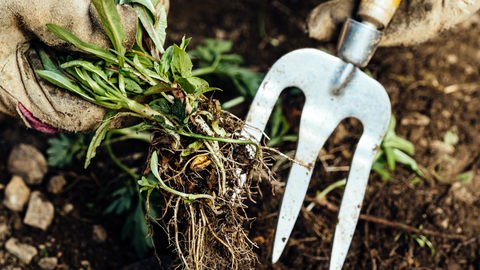6 Do's & Don'ts of Winter Gardening
By Victoria Fuller
Winter is just around the corner and that can only mean one thing: Gardening season is over, right? RIGHT?! Well we are pleased to say “not necessarily!”. As long as you take certain “do’s and don’ts” into consideration when gardening then there is absolutely no reason that you can’t find botanical success all year-round! Now without further ado let’s dig into our top 6 do’s and don’ts of winter gardening!

DO: ADD MULCH!
Many people believe that the only time of year that you should be adding mulch to your garden is during the Spring time but this is untrue! Adding mulch to your soil when the temperature starts to dip is a fantastic way to insulate your soil and to protect any bulbs or plants that may be lying dormant during the colder months.
The best time to add mulch to your soil is right around the time of the first frost, this will help to stabilize the temperature of the soil. Soil underneath mulch often doesn't freeze as it has the added insulation, this allows the plants underneath to absorb more water and gives them a better chance at success!
Shredded bark and straw are two examples of nutritious organic matter that you can include in your winter mulch! This can also help weed development which will save you a job in the Spring!

DON’T: FERTILIZE
The jury is still out on whether or not fertilizing during the colder months is a good idea for your garden. Many people make the argument that “adding nutrients now will be good for growth later on” which does have a semblance of truth to it, but unfortunately fertilizing during the colder months can do significantly more damage than good.
If you fertilize your garden right as the frosts set in then you are effectively encouraging new plant growth just in time for the plants to meet a chilled and untimely demise.
The best time of year to add fertilizer is following the last frost, this will provide your plants the nutrients they need just as they are embarking on their journey!

DO: PROTECT YOUR PLANTS
Protecting plants varies based on the level of protection needed for the plants you are growing.
If you have a Cedar Planters raised garden bed or planter box then we would recommend investing in one of our custom made winter covers to not only protect the soil inside but also to preserve the appearance of your investment!
Western Red Cedar is resistant to rot but if you want to keep the vibrancy of your garden bed then it’s best to protect it from the harsher elements!
Another method of protection is to bring certain plants indoors. Having an area set aside in the garage with a grow lamp such as this one can help not only extend the life of your existing plants by providing consistent soil temperatures but can also provide the opportunity to start cultivating seedlings in the Springtime!
DON’T: IGNORE PERENNIAL WEEDS
A common misconception is “the Winter will kill the weeds in my garden so I don’t have to worry about them”. Unfortunately this could not be further than the truth. If you leave your weeds over the Winter they will develop an even stronger root system and be extremely difficult to get under control in the Spring.
Many types of perennial weeds even drop their seeds in the Fall where they then lie dormant during the Winter in order to thrive in the Spring: they have a whole built-in system that banks entirely on you not pulling your weeds!
Weeding during the Fall and Winter months is also a fantastic way to keep busy in the garden when growing season isn't quite in full swing.
This article from "Family Handy Man" has some great tips on controlling weeds in Winter.

DO: WATER!
Wherever you live in the world the reality of the plant-based matter remains the same: plants are not dead during dormancy and still have metabolic needs during the colder months! Water is one of the only needs that plants have so make sure to keep your roots moist no matter the weather!
Many gardeners worry that a frozen root system will cause severe damage to their plants so we would recommend watering earlier in the day, this means that the soil will have time to actually create insulation with the water and protect the plant roots against potential nighttime freezing!
Having a raised garden bed or planter box is also a fantastic way to avoid having to worry about your roots freezing as they have the added protection of elevation and insulation!

DON’T: WORRY!
One of the easiest things to do when we wake up to frosts and see all of our plant children wilting and lying dormant is to simply panic and give up. Gardening is the definition of a seasonal pastime and Winter tends to be the least exciting time of year for gardeners, but this doesn’t mean that we should all just throw in our gloves and fall into a pit of despair!
Between maintaining our existing gardens with Winter covers, mulching, and watering we have plenty to keep us busy, as well as planning for the next season’s garden adventure!
In conclusion your garden can be your literal and figurative escape from reality all year-round as long as you are prepared to accept a few seasonal limitations and make a few changes to cater to changing weather conditions.
Don’t let the month at the top of the calendar indicate whether or not you should be able to enjoy your favourite hobby, simply look at it from another angle (and maybe add another scarf) and get right back into it!











Leave a comment